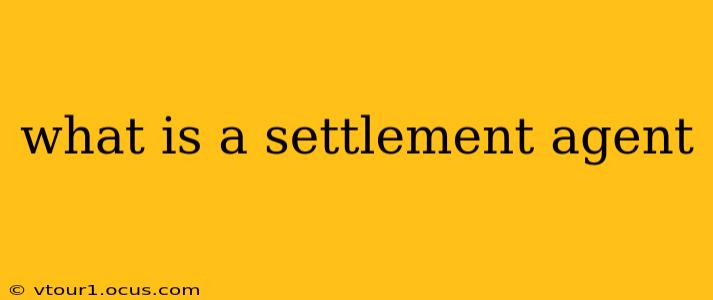What is a Settlement Agent? Your Guide to Smooth Property Transactions
A settlement agent, also known as a closing agent or escrow agent, plays a crucial role in ensuring a smooth and legally sound property transaction. They act as a neutral third party, managing the complex financial and legal aspects of the sale or purchase of real estate. Think of them as the orchestrator of the closing process, bringing together all the necessary parties and paperwork to finalize the deal. Their involvement protects both the buyer and the seller, safeguarding their interests throughout the transaction.
This guide will delve into the specifics of what a settlement agent does, addressing common questions and providing clarity on their vital function in the real estate industry.
What does a settlement agent do?
Settlement agents handle numerous critical tasks, including:
- Managing Escrow Funds: They receive and hold the buyer's down payment, loan proceeds, and other funds involved in the transaction in a secure escrow account. This ensures that the money is disbursed only after all the agreed-upon conditions are met.
- Preparing Closing Documents: This is arguably their most significant responsibility. They prepare and review all the necessary legal documents, including the deed, mortgage, and other relevant paperwork, ensuring accuracy and compliance with all applicable laws and regulations.
- Disbursing Funds: Once all conditions are satisfied, the settlement agent distributes the funds according to the terms of the sale agreement. This includes paying off the seller's mortgage, paying real estate commissions, and transferring the remaining funds to the seller.
- Reconciling the Transaction: They meticulously reconcile all financial aspects of the transaction, ensuring all accounts are balanced and that all parties receive the correct amount of money. This involves careful tracking of expenses and debits.
- Title Search and Insurance: In many jurisdictions, settlement agents are also involved in conducting or overseeing title searches to ensure the seller has clear ownership of the property. They often facilitate the purchase of title insurance, protecting both buyer and seller from potential title defects.
- Answering Questions and Providing Guidance: Throughout the process, they act as a valuable resource, answering questions and providing guidance to both buyers and sellers.
What is the difference between a settlement agent and a real estate agent?
It's crucial to understand the distinct roles of a settlement agent and a real estate agent. While both are involved in real estate transactions, their functions are completely separate:
- Real Estate Agents: Represent buyers or sellers, negotiating the terms of the sale and advocating for their clients' best interests. They are typically compensated through commissions.
- Settlement Agents: Act as neutral third parties, managing the financial and legal aspects of the closing process. They are compensated through fees for their services.
The two professions work in tandem to successfully complete a real estate transaction.
Who pays the settlement agent?
The fees for a settlement agent's services are typically split between the buyer and seller, as outlined in the purchase agreement. However, the exact breakdown can vary depending on local customs and the specific terms of the contract.
What qualifications do settlement agents need?
The specific qualifications for becoming a settlement agent vary by state or jurisdiction. Generally, they require licensing, bonding, and often ongoing professional development to maintain their expertise in real estate law and finance. This ensures they possess the necessary knowledge and skills to handle the complex financial and legal aspects of property transactions.
Are settlement agents licensed?
Yes, settlement agents are typically licensed professionals, regulated at the state or jurisdictional level. The licensing requirements ensure a level of competency and accountability, protecting buyers and sellers from potential fraud or mismanagement. Licensing information should be readily available through relevant state agencies.
By understanding the role of a settlement agent, both buyers and sellers can navigate the real estate closing process with greater confidence, knowing their interests are protected and the transaction is handled by a qualified professional.
